The rain lashed down in Moscow, and snow turned to slush beneath our feet as we hobbled, saddled with not only our rucksacks but also a week’s supply of super noodles, beer and vodka (oh, and some Smash), to Yaroslavsky station where we were to board the Trans-Siberian train.
We practically fell into our cabin, our 8×6′ home for the next 7 days. Naturally we’d been a little concerned about who we’d be sharing a berth with and were pleased to see that, whoever they were, we’d beaten them there – to the best bunks and storage areas. We then had a nervous wait to find out who’d be our room-mates for the next week. The rest of the carriage was filling up, but with 10 minutes to go we were still alone. Could this mean…? Five minutes to go: we sat patiently, checking our watches. Still no sign of anyone. The train pulled away…we had the whole cabin to ourselves. Oh thank you benevolent train gods! We danced around the cabin and cracked open the vodka.
Daylight woke us with a snowy scene rushing past our window – we were so excited! Through the ever-so-slight hangover we began to hear a Babel’s tower of voices float in from the corridor. Sharing our carriage were a group of boisterous Swedes, a lone British girl leaving no country unturned (even North Korea) in her quest to see Asia , a thoughtful Japanese guy, a burly Russian with a dazzling set of gold teeth, a quiet Italian, a Mongolian trader and his wife…and Bruce.
Bruce was a chirpy Chinaman on his way back from studying in the Ukraine. In one of his guises he had worked translating English business documents into Chinese and every now and again his language slipped into flowery legalese. Our first encounter with Bruce ended with his explaining why the London Olympics were such a failure, he backed off when he saw we were getting annoyed, “I apologise unreservedly if I have offended you, I meant it as a detraction only on your government.” There was no way we could stay annoyed, the guy was priceless – in more ways than one. He could speak Russian, Chinese and English, and loved nothing more than talking. He’d think nothing of pulling open a shut cabin door and shouting “Hello, how are you!?” to the occupants, anything to instigate a conversation. And to be fair, usually an interesting one.
An environment developed which is not unlike that of a prison; there was nowhere to go, supplies, electricity and favours from the guards could only be obtained by those in the know, perhaps with a little bribe. A carriage hierarchy began to assert itself. The guards were at the top (not, incidentally, the miserly provodnitsas we had feared but a gang of smiley Chinese instead), who would often importune us with requests to change up a dubious $100 note, and who had access to cooking facilities, power for charging electronic devices, and control over the heating. Next came the Mongolian trader, who had clearly done this journey many times (as evinced by the taping up of the windows in his cabin to prevent drafts and his ability to conjure up milk and bread), and next Bruce who was the only person able to communicate with everyone aboard. The Russian mafiosi seemed content to attempt to out-smoke the train on his way to Beijing, and the rest of us were all travellers.
So how do you spend your time on the Trans-Sib? Plenty of sleeping (Amy’s chosen Olympic sport), reading, talking (mainly with Bruce), thinking of ways to make super-noodles interesting, oh – and plenty of vodka drinking. Friday night was vodka night (even more so than the others), so Saturday morning was hangover day. Another night the Mongolian trader invited us to dinner in his cabin where the enterprising soul had managed to cook a chicken – we didn’t ask any questions, just wolfed it down!
Prison comparisons notwithstanding, it was an amazing experience. The backdrop to it all was, of course, Siberia. An endless snowy panorama comprising scraggly birch and pine tree copses, barren tundra and taiga, rivers frozen in their tracks and grim cities, one so abject it prompted Amy to ask “has Ross Kemp been here?”
Gradually, as we neared Mongolia, the snow lessened and the landscape began to change. Hills grew in the distance and we passed a lake so frozen that cars were whizzing around on its surface. Soon we were in the Gobi desert, a vast openness peppered with gangs of wild horses, cattle, even camels. This was our last night and we decided to treat ourselves to dinner in the newly attached Mongolian dining car, where we sat and watched the sun set over the plains.
We awoke in China to find ourselves passing through an industrial wasteland, filthy with rubbish and hazy with smog; chimneys belching in the background, scorched earth in the fore. It was somehow still quite captivating but happily gave way to some pretty serious mountains which the train bored through.
A great trip but nobody was upset to get off at Beijing. Well, except Bruce.

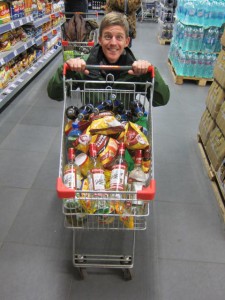
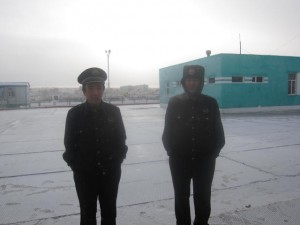
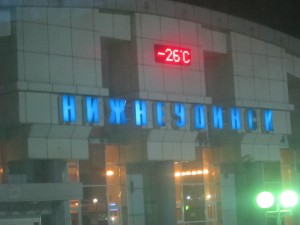
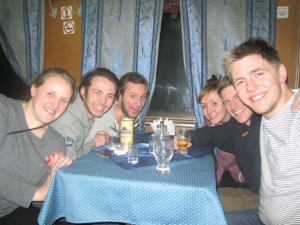
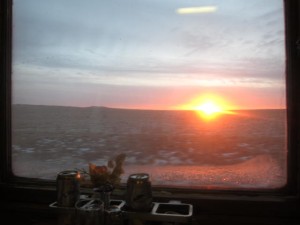
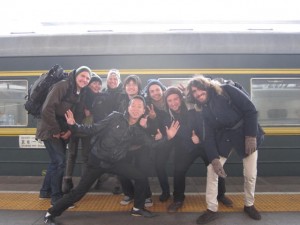
Loved your account of your Trans-sib adventure. Your description was so vivid that I almost felt I was sat on the train with you.Mind you, with that cast of characters, it sounded like the plot for an Agatha Christie film!!
Love Mum (aka Ma ) xx